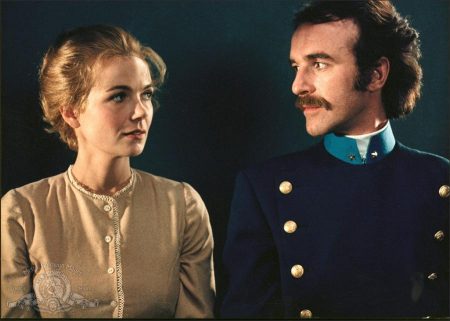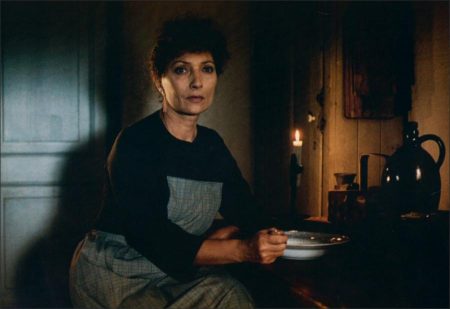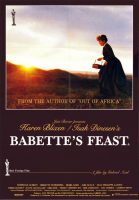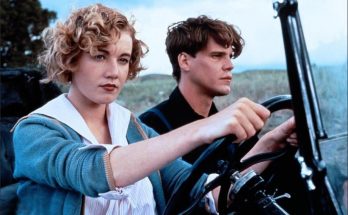Babette’s Feast movie storyline. In a remote 19th-century Danish village, two sisters lead a rigid life centered around their father, the local minister, and their church. Both had opportunities to leave the village: one could have married a young army officer and the other, a French opera singer. Their father objected in each case, and they spent their lives caring for him.
Many years later – their father is now deceased – they take in French refugee, Babette Hersant, who agrees to work as their servant. After winning the lottery, Babette wants to repay the sisters for their kindness and offers to cook a French meal for them and their friends on the 100th anniversary of their father’s birth. It proves to be an eye-opening experience for everyone.
Babette’s Feast (Danish: Babettes gæstebud) is a 1987 Danish drama film directed by Gabriel Axel. The film’s screenplay was written by Axel based on the story by Isak Dinesen (Karen Blixen). Produced by Just Betzer, Bo Christensen, and Benni Korzen with funding from the Danish Film Institute, Babette’s Feast was the first Danish cinema film of a Blixen story. It was also the first Danish film to win the Academy Award for Best Foreign Language Film.[2] The film premiered in the Un Certain Regard section of the 1987 Cannes Film Festival.
About the Story
The elderly and pious Protestant sisters Martine (Birgitte Federspiel) and Philippa (Bodil Kjer) live in a small village on the remote western coast of Jutland in 19th-century Denmark. Their father was a pastor who founded his own Pietistic conventicle. With their father now dead and the austere sect drawing no new converts, the aging sisters preside over a dwindling congregation of white-haired believers.
The story flashes back 49 years, showing the sisters in their youth. The beautiful girls have many suitors, but their father rejects them all, and indeed derides marriage. Each daughter is courted by an impassioned suitor visiting Jutland – Martine by a charming young Swedish cavalry officer, Lorens Löwenhielm, and Philippa by a star baritone, Achille Papin, from the Paris opera, on hiatus to the silence of the coast. Both sisters decide to stay with their father and spurn any life away from Jutland.
Thirty five years later, Babette Hersant (Stéphane Audran) appears at their door. She carries only a letter from Papin, explaining that she is a refugee from counter-revolutionary bloodshed in Paris, and recommending her as a housekeeper. The sisters cannot afford to take Babette in, but she offers to work for free. Babette serves as their cook for the next 14 years, producing an improved version of the bland meals typical of the abstemious nature of the congregation, and slowly gaining their respect.
Her only link to her former life is a lottery ticket that a friend in Paris renews for her every year. One day, she wins the lottery of 10,000 francs. Instead of using the money to return to Paris and her lost lifestyle, she decides to spend it preparing a delicious dinner for the sisters and their small congregation on the occasion of the founding pastor’s hundredth birthday. More than just a feast, the meal is an outpouring of Babette’s appreciation, an act of self-sacrifice; Babette tells no one that she is spending her entire winnings on the meal.
The sisters accept both Babette’s meal and her offer to pay for the creation of a “real French dinner”. Babette arranges for her nephew, a merchant, to go to Paris and gather the supplies for the feast. The ingredients are plentiful, sumptuous and exotic, and their arrival causes much discussion among the villagers. As the various never-before-seen ingredients arrive, and preparations commence, the sisters begin to worry that the meal will become a sin of sensual luxury, if not some form of devilry. In a hasty conference, the sisters and the congregation agree to eat the meal, but to forgo speaking of any pleasure in it, and to make no mention of the food during the dinner.
Babette’s Feast (1987)
Directed by: Gabriel Axel
Starring: Stéphane Audran, Bodil Kjer, Birgitte Federspiel, Jarl Kulle, Jean-Philippe Lafont, Bibi Andersson, Ghita Nørby, Asta Esper Hagen Andersen, Vibeke Hastrup
Screenplay by: Karen Blixen, Gabriel Axel
Production Design by: Sven Wichmann
Cinematography by: Henning Kristiansen
Film Editing by: Finn Henriksen
Costume Design by: Annelise Hauberg, Karl Lagerfeld, Pia Myrdal
Set Decoration by: Peter Obeling Johannsen
Music by: Per Nørgaard
Distributed by: Orion Classics
Release Date: August 28, 1987
Views: 212





